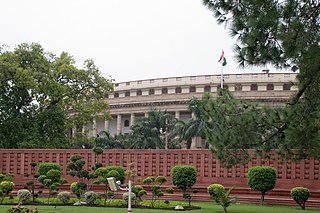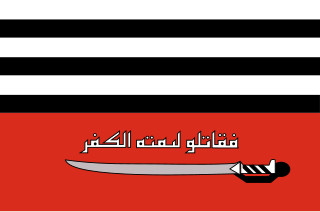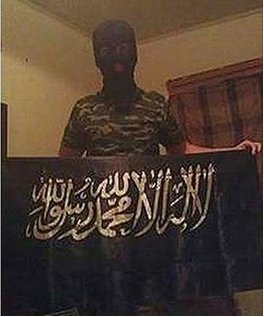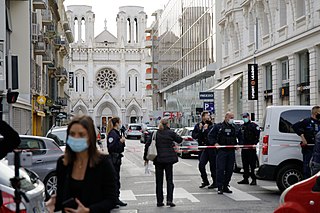Related Research Articles

The 2001 Indian Parliament attack was a terrorist attack on the Parliament of India in New Delhi, India on 13 December 2001. The attack was carried out by five armed assailants that resulted in the deaths of six Delhi Police personnel, two Parliament Security Service personnel, and a gardener. All the five terrorists were killed by security forces.

The situation of Human Rights in Pakistan is complex as a result of the country's diversity, large population, its status as a developing country and a sovereign Islamic democracy with a mixture of both Islamic and secular law.
The Kaluchak Massacre was a terrorist attack on 14 May 2002 near the town of Kaluchak in the Indian state Jammu and Kashmir. Three militants attacked a Himachal Road Transport Corporation bus from the Indian state of Himachal Pradesh from Manali to Jammu and killed 7 people. After that they entered the family quarter of the Army and fired indiscriminately at the inmates, killing 23 persons, including 10 children, eight women and five Army men. The age of the children killed ranged from four to 10 years. Thirty-four people were injured in the attack.

The Lashkar-e-Jhangvi, is a Deobandi supremacist, terrorist and militant organisation based in Afghanistan. The organisation operates in Pakistan and Afghanistan and is an offshoot of anti-Shia party Sipah-e-Sahaba Pakistan (SSP). The LeJ was founded by former SSP activists Riaz Basra, Malik Ishaq, Akram Lahori, and Ghulam Rasool Shah.
Events from the year 2010 in Pakistan.
Events in the year 2011 in Pakistan.
In 2007, 34 terrorist attacks and clashes, including suicide attacks, killings, and assassinations, resulted in 134 casualties and 245 injuries, according to the PIPS security report. The report states that Pakistan faced 20 suicide attacks during 2007, which killed at least 111, besides injuring another 234 people. The PIPS report shows visible increase in suicide attacks after the siege of Lal Masjid.
In 2002, 14 terrorist, insurgent and sectarian-related incidents were reported that killed 60 people and injured 150.
This is a list of terrorist incidents in Pakistan in 2013. Some of the incidents are sectarian in nature and the TTP is responsible for a majority of them.

On 23 September 2014, 18-year-old Abdul Numan Haider attacked two counter-terrorism police officers with a knife outside the Victoria Police Endeavour Hills police station located in Endeavour Hills, a suburb of Melbourne, Victoria, Australia. He was then shot dead.
The National Action Plan is an action plan that was established by the Government of Pakistan in December 2014 to crack down on terrorism and to supplement the ongoing anti-terrorist offensive in Federally Administered Tribal Areas. It is considered as a major coordinated state retaliation following the deadly 2014 Peshawar school attack. The plan received unprecedented levels of support and co-operation across the country's political spectrum, inclusive of the federal and provincial governments.

On 15 March 2015, two explosions took place at Roman Catholic Church and Christ Church during Sunday service in Youhanabad, Lahore, Pakistan. At least 15 people were killed and seventy were wounded in the attacks.

On 27 March 2016, on Easter Sunday, at least 75 people were killed, and over 340 were injured, in a suicide bombing that hit the main entrance of Gulshan-e-Iqbal Park, one of the largest parks in Lahore, Pakistan. The attack targeted Christians who were celebrating Easter. The majority of the victims were women and children. Jamaat-ul-Ahrar, a group affiliated with the Pakistani Taliban, claimed responsibility for the attack. The attack led to worldwide condemnation and national mourning throughout Pakistan. Pakistan also launched a widespread counter-terrorism operation in South Punjab, arresting more than 200 people who may have had a possible connection to the attack.

On 8 August 2016, terrorists attacked the Government Hospital of Quetta in Pakistan with a suicide bombing and shooting. They killed more than 70 people, mainly lawyers, and injured more than 130 others. The fatalities were mainly advocates (lawyers) who had assembled at the hospital where the body of Advocate Bilal Anwar Kasi, the president of the Balochistan Bar Association, was brought after he was shot dead by an unknown gunman. Responsibility for the attack has been claimed by various Islamist groups like Jamaat-ul-Ahrar and the Islamic State. Between 70 and 94 people were killed and over 120 injured. 54 of those killed were lawyers.

On 24 October 2016, three heavily armed terrorists carried out an attack on the Balochistan police training college in Quetta, Pakistan, killing 61 cadets and injuring more than 165 others. The Islamic State of Iraq and the Levant – Khorasan Province claimed responsibility for the attack, and Pakistan-based Lashkar-e-Jhangvi claimed to have collaborated with them. According to Pakistani authorities, the assailants came from Afghanistan and were in contact with their handlers there while perpetrating the attack.
Operation Radd-ul-Fasaad is a codename of a combined military operation by the Pakistani military in support of local law enforcement agencies to disarm and eliminate the terrorist sleeper cells across all states of Pakistan, started on 22 February 2017. The operation is aimed to eliminate the threat of terrorism, and consolidating the gains of Operation Zarb-e-Azb which was launched in 2014 as a joint military offensive. It is further aimed at ensuring the security of Pakistan's borders. The operation is ongoing active participation from Pakistan Army, Pakistan Air Force, Pakistan Navy, Pakistan Police and other Warfare and Civil Armed Forces managed under the Government of Pakistan. More than 375,000 operations have been carried out against terrorists so far. This operation has been mostly acknowledged after Operation Zarb e Azb.
The Bahawalpur church shooting was a mass shooting at Saint Dominic's Church in Bahawalpur, Punjab, Pakistan on 28 October 2001 by six assailants belonging to Lashkar-e-Jhangvi. The guard of the church and 17 other Christians were killed.
Terrorist incidents in Pakistan in 2018 include:
On 22 July 2018, 3 days before general elections, a suicide bomber blew himself near the vehicle of former KPK provincial minister of Agriculture Ikramullah Khan Gandapur in Kulachi, Dera Ismail Khan District, Pakistan. The prime target of attack, Gandapur was brought to Dera Ismail Khan in critical condition where he succumbed to his wounds. Apart from Gandapur, his driver and one of his guards was also killed and three more people were injured. Tehrik-i-Taliban Pakistan (TTP) claimed responsibility for the assault describing Gandapur's killing of their colleague militants as the motive. The attack was widely condemned across Pakistan.

On the morning of 29 October 2020, three people were killed in a stabbing attack at Notre-Dame de Nice, a Roman Catholic basilica in Nice, France. The alleged attacker, Tunisian man Brahim Aouissaoui, was shot by the police and taken into custody. Both French President Emmanuel Macron and the mayor of Nice, Christian Estrosi, said it was a terrorist attack attributed to Islamic extremism.
References
- ↑ "'Trained terrorists' behind Pakistan church slayings", CNN, 28 October 2001.
- ↑ "South Asia - Christians massacred in Pakistan". BBC News. 28 October 2001.
- ↑ "Pak interior minister's brother shot dead", The Times of India, 22 December 2001.